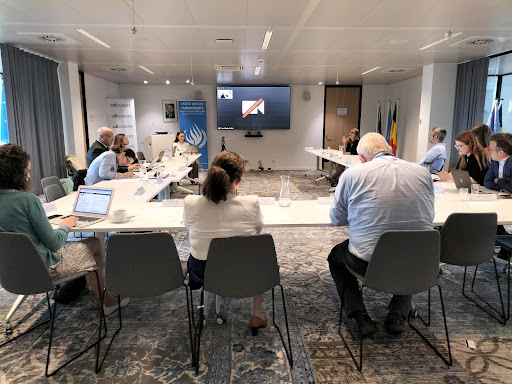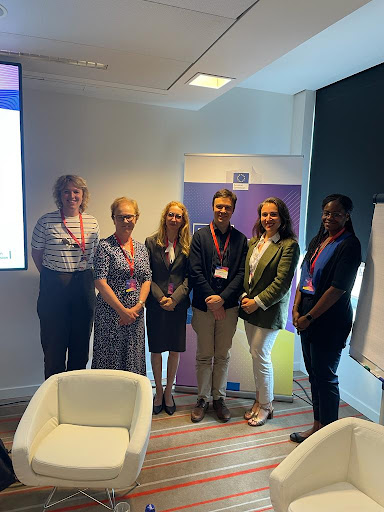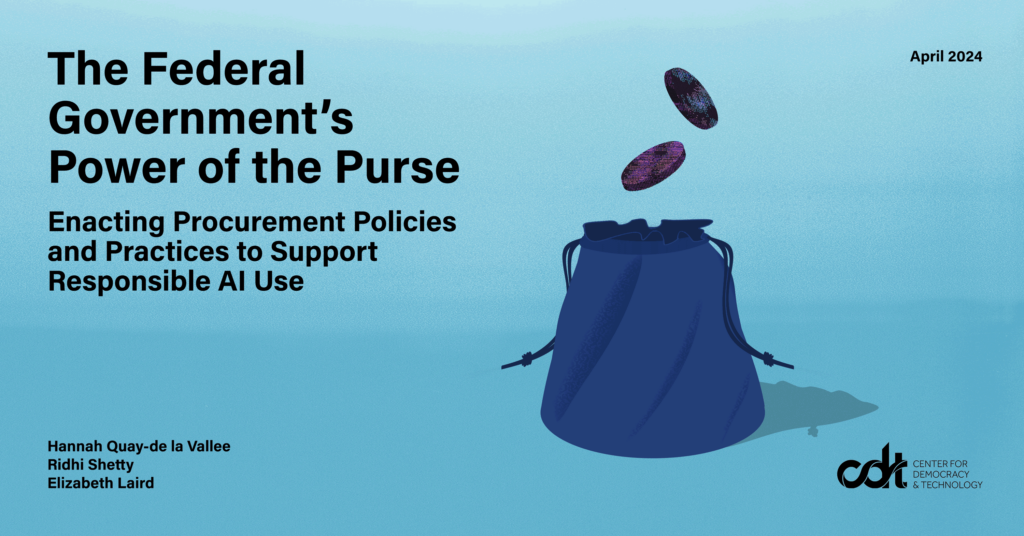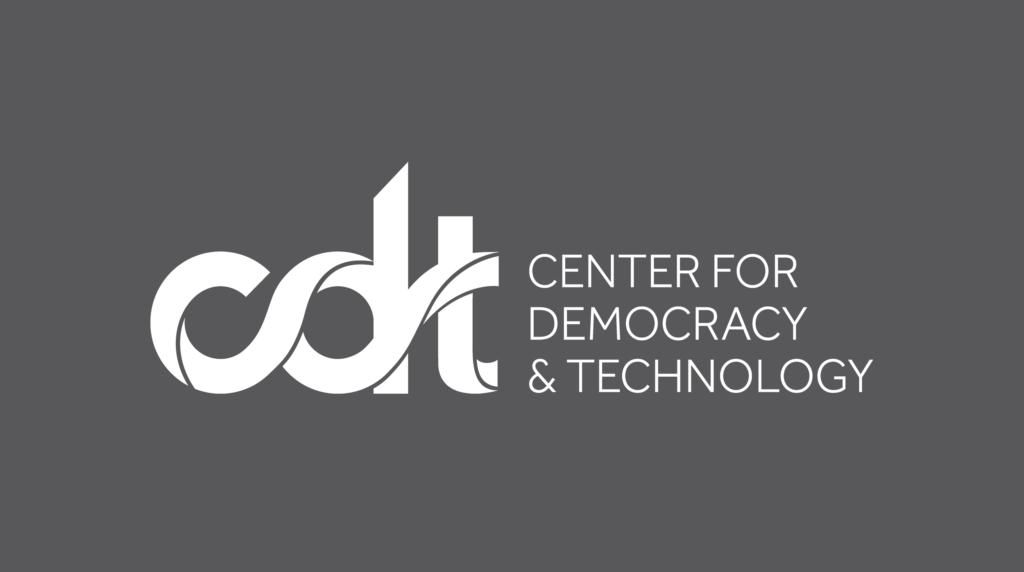AI Policy & Governance, European Policy, Privacy & Data
EU Tech Policy Brief: July 2023
Also authored by CDT Europe’s Vânia Reis and Rachele Ceraulo
This is the July 2023 issue of the Centre for Democracy & Technology Europe‘s monthly Tech Policy Brief. It highlights some of the most pressing technology and internet policy issues under debate in Europe, the U.S., and internationally, and gives CDT’s perspective on them. Our aim is to help shape policies that advance our rights in a digital world. Please do not hesitate to contact our team in Brussels: Iverna McGowan, Asha Allen, and Ophélie Stockhem.
Combatting Child Sexual Abuse Online: Joint Event With UN Human Rights Office

On 12 June, CDT Europe held an expert seminar with the UN Human Rights Office bringing together representatives from member states, EU institutions, child rights and digital rights organisations, public interest technologists, and scholars.
The first session, moderated by CDT Europe Director Iverna McGowan, delved into the question of the legality of the proposal, assessing whether it conforms with existing EU laws on content moderation and data protection. Participants also evaluated the criteria of necessity and proportionality in the context of scanning for online child sexual abuse. This was followed by a discussion on the feasibility of proposed measures, specifically on the efficacy and shortcomings of scanning technologies and the human rights and security risks associated with efforts to undermine the security of communications.
CDT Europe Joins Democracy Alive Summit
The spread of disinformation and continued misuse of our personal sensitive data by malign actors to influence elections poses a significant threat to election integrity and democracy. Ahead of the upcoming European elections, CDT Europe joined the European Movement International’s Democracy Alive: Brussels Summit on 6 June, which brought together EU policymakers, academics, and civil society representatives to discuss the state of democracy in Europe and explore effective responses to threats to democratic governance. CDT Europe Advocacy Director for Europe, Online Expression & Civic Space, Asha Allen, spoke on a panel about empowering citizens and society’s resilience to disinformation, and how to protect our democracies from external interference whilst protecting fundamental rights.
In her remarks, Allen recommended avoiding creating a legislative and policy framework aimed at addressing disinformation, which may unintentionally put free expression and freedom of association at risk. As for a long-term framework, she highlighted the need for effective policies and meaningful due diligence, and support for civil society actors working to improve trust in our democracies. She said the initiatives should consider increasing transparency and accountability whilst boosting support and resourcing for independent election oversight bodies, journalists, and civic space actors who are vital in protecting the integrity of elections.
CDT Europe Co-Hosts Event with Article 19: Uniting Civil Society and Regulators for Effective DSA Enforcement and Implementation
How can we ensure the effective implementation and enforcement of the EU’s upcoming Digital Services Act? That was the question addressed by CDT Europe and Article 19 during a joint event that took place on 26 June. Building on key findings and recommendations from Dr. Suzanne Vergnolle’s report, “Putting collective intelligence to the enforcement of the Digital Services Act”. The discussion provided a platform for open dialogue and exchange of ideas, focusing on the role of civil society in shaping the DSA’s enforcement regime. It attracted attendees from civil society, EU institutional representatives, and national regulators.
A key topic it explored was the possible long-term cooperation mechanisms between civil society and national and EU authorities. The need for the creation of expert groups — formalised and structured advisory bodies — was clear. These would support the Commission and the Digital Services Coordinators with evidence-based recommendations and guidance in the enforcement and implementation of the DSA. It is vital, though, that such expert bodies are representative, and this goal could be hindered by resource constraints of smaller organisations and a lack of representation of marginalised and vulnerable communities — another issue that came up during the discussion.
Important progress was made during the event in laying the groundwork for further exploration in identifying concrete methods for ensuring effective collaboration with civil society throughout the DSA enforcement process. It was acknowledged that civil society organisations play a key role as forerunners of global conversations around the potential ramifications of the DSA in other jurisdictions.
CDT Europe Joins Digital Services Act Stakeholder Event

As debates have begun on the implementation of the EU’s Digital Services Act (DSA), the bloc’s flagship online platforms governance regulation, the European Commission hosted its “Digital Services Act Stakeholder Event: Shaping the Future of Digital Services” on 27 June. The conference connected industry and civil society with policymakers to exchange expertise on crucial aspects of implementing the regulation. Asha Allen, CDT Europe Advocacy Director for Europe, Online Expression & Civic Space, joined a panel discussion about recent developments on the issue of online gender-based violence (GBV) in the EU.
During the panel, Allen argued that very large online platforms and search engines should prioritise transparency and meaningful consultation with civil society as they fulfill their mandatory due diligence obligations, in particular those around risk assessment and mitigation. EU lawmakers must prioritise ensuring that the existing and constantly developing legal framework to address online gender-based violence is proportionate, harmonised, and effective.
Allen also emphasised that the regulatory initiatives to address online GBV, such as content takedowns and the criminalisation of certain forms of online GBV, must be aligned with the DSA’s legal standards. She also argued that, to ensure legal coherency and to protect freedom of expression, such initiatives should be aligned with international human rights frameworks such as the Rabat Principles.
CDT Europe Leads Civil Society Letter Raising Concerns Over Weakening of Personal Data & Privacy Protections in Political Advertising
On 12 June, CDT Europe led a civil society open letter — published by Politico and signed by 26 civil society partners — raising strong concerns over plans to weaken personal data and privacy protections in the proposed Regulation on the Targeting and Transparency of Political Advertising. The letter reacted to a leaked “non-paper” from the European Commission Services, which demonstrates an apparent disregard among some negotiators for the human rights risks associated with restrictions to political speech, and a willingness to allow the use of sensitive categories of personal data — such as ethnicity, religious belief, or information on gender or sexual orientation — in the targeting of political advertising.
The letter raised the alarm at the flawed assumption that targeting based on sensitive categories of data will deliver on the promise of reaching a desired demographic. In reality, such targeting only reinforces existing abuses of people’s privacy and perpetuates patterns of discrimination. The letter also cautioned policymakers against imposing broad and disproportionate restrictions on political speech, or using the proposed Regulation as a vehicle to tackle foreign disinformation campaigns, as doing so would set a dangerous precedent for diminishing international human rights standards.
CDT Europe and civil society partners further urged the European Parliament and EU Member States to prohibit the use of personal or inferred data in the context of political advertising, and ensure that the scope of the Regulation is narrowed to only capture paid or sponsored political content intended to influence the outcome of electoral processes.
Artificial Intelligence Act Snapshot
On 14 June, the European Parliament voted on its long-awaited report on the Artificial Intelligence Act, a sweeping package that aims to regulate the use of artificial intelligence in compliance with human rights and the rule of law.
In line with its commitments to human rights, the European Parliament adopted protective amendments, such as a full ban on the use of “real-time” remote biometric identification systems in public spaces, and an obligation for deployers of high-risk AI systems to conduct fundamental rights impact assessments for those systems.
EU lawmakers also adopted provisions to ensure that the AI Act enhances transparency and accountability to individuals affected by the use of AI systems, particularly those from marginalised or vulnerable communities who face greater risks from their use. These include a mechanism for individuals to understand, seek explanation, and gain access to remedy and justice when their fundamental rights have been infringed upon.
The AI Act has now entered the final stage of negotiations between the European Commission, European Parliament, and Council — commonly known as the Trilogues. Civil society calls on EU lawmakers to ensure that the final version of the text reflects the values and fundamental rights enshrined in the EU Charter, and that it integrates a strong human rights approach, a process that will require open and transparent negotiations that truly involve civil society organisations.
As outstanding human rights concerns remain regarding the use of AI systems by law enforcement and migration control authorities, CDT Europe urges negotiators to take heed of the European Parliament’s position and maintain the prohibitions and additional safeguards against law enforcement’s use of biometric surveillance technologies.
Don’t forget to check out CDT’s publications for this month, and to sign up for CDT Europe’s AI newsletter!


